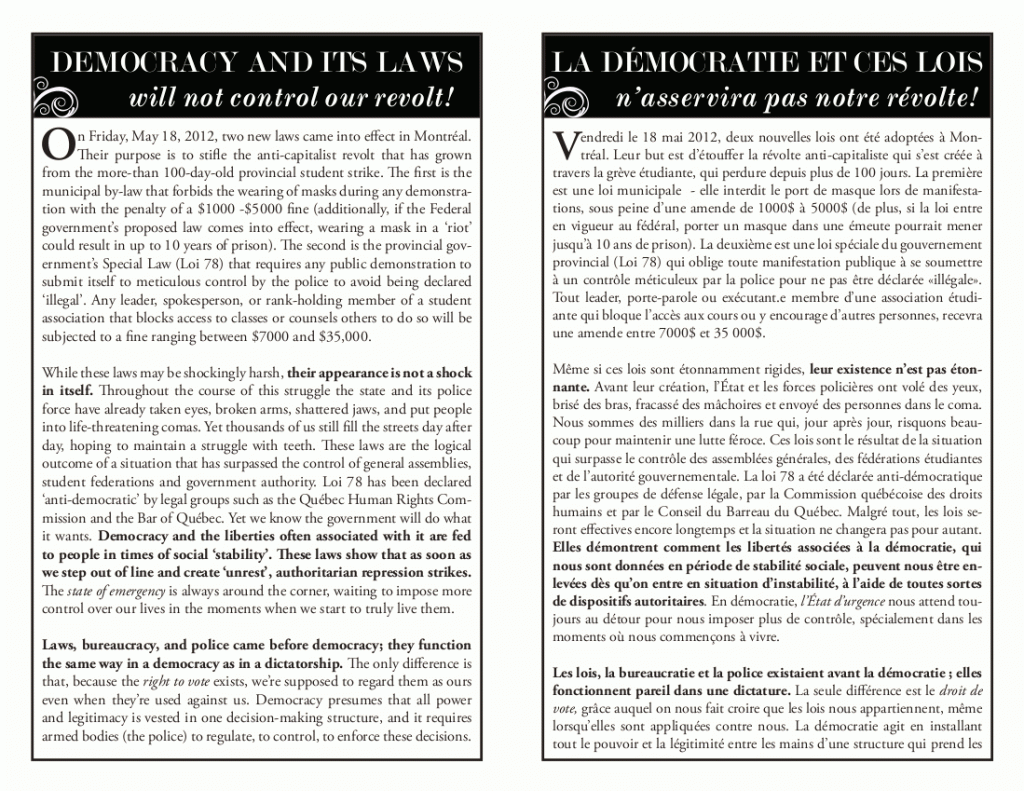On Friday, May 18, 2012, two new laws came into effect in Montréal. Their purpose is to stifle the anti-capitalist revolt that has grown from the more-than 100-day-old provincial student strike. The first is the municipal by-law that forbids the wearing of masks during any demonstration with the penalty of a $1000 -$5000 fine (additionally, if the Federal government’s proposed law comes into effect, wearing a mask in a ‘riot’ could result in up to 10 years of prison). The second is the provincial government’s Special Law (Loi 78) that requires any public demonstration to submit itself to meticulous control by the police to avoid being declared ‘illegal’. Any leader, spokesperson, or rank-holding member of a student association that blocks access to classes or counsels others to do so will be subjected to a fine ranging between $7000 and $35,000.
While these laws may be shockingly harsh, their appearance is not a shock in itself. Throughout the course of this struggle the state and its police force have already taken eyes, broken arms, shattered jaws, and put people into life-threatening comas. Yet thousands of us still fill the streets day after day, hoping to maintain a struggle with teeth. These laws are the logical outcome of a situation that has surpassed the control of general assemblies, student federations and government authority. Loi 78 has been declared ‘anti-democratic’ by legal groups such as the Québec Human Rights Commission and the Bar of Québec. Yet we know the government will do what it wants. Democracy and the liberties often associated with it are fed to people in times of social ‘stability’. These laws show that as soon as we step out of line and create ‘unrest’, authoritarian repression strikes. The state of emergency is always around the corner, waiting to impose more control over our lives in the moments when we start to truly live them.
Laws, bureaucracy, and police came before democracy; they function the same way in a democracy as in a dictatorship. The only difference is that, because the right to vote exists, we’re supposed to regard them as ours even when they’re used against us. Democracy presumes that all power and legitimacy is vested in one decision-making structure, and it requires armed bodies (the police) to regulate, to control, to enforce these decisions. Knowing this, we fight for true liberation, not just a less-shitty politician in the same oppressive power structure.
Resistance must spread, evolve and continue indefinitely. We have watched the situation transform from a limited strike with reformist goals to a generalized revolt with revolutionary aspirations. It is not just about tuition fees. This system that increases the cost of education is the same that cuts pensions and welfare in the name of austerity, turns forests to concrete and lakes to oil spills in the name of progress and industry, kills entire communities in the name of security and patriotism, and views lives as expendable in the name of profit. Capitalism and the state must be combatted in many ways.
Banging pots and pans in our neighbourhoods every night at 8pm is one way to do so, as well a way to build neighborhood cultures of resistance and start to form social relations outside the walls of isolation built by this society. But we must remember that power does not concede when simply asked. Even Finance minister Raymond Bachand approves of these casseroles demos, stating that they are festive and ‘send the right message’. In an effort to divide us into ‘good protestor’ and ‘bad protestor’, he wants to keep people’s participation pacified and business-as-usual continuing in the city. But we know that diverse and confrontational tactics will not only empower us to begin to act in this world on our own terms, but also to create a force to be reckoned with…
A force the state can no longer ignore!



